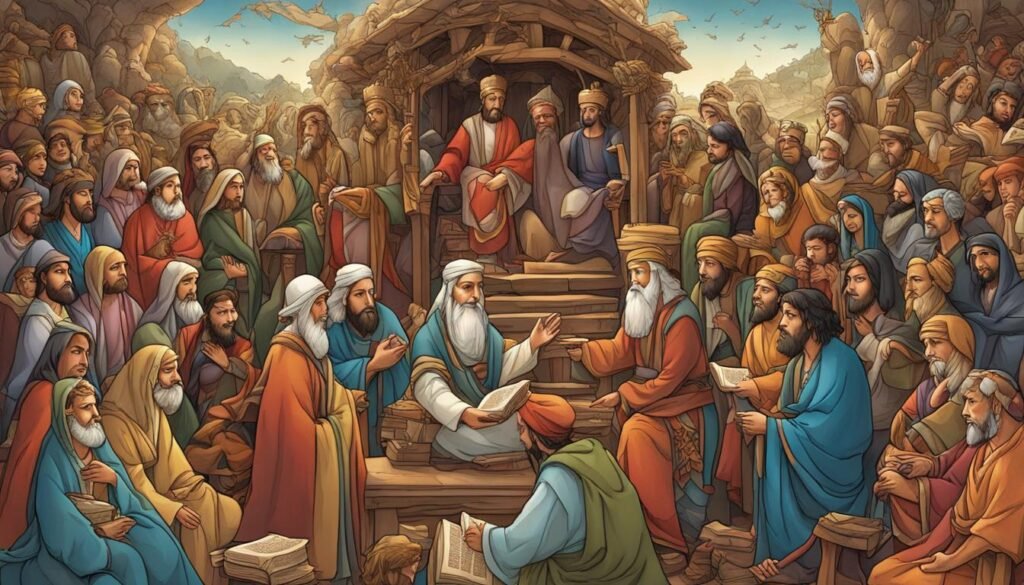According to various sources, it is difficult to determine the exact number of unique events or stories in the Bible. Estimates range from 600 to 800 events. The Story of Hope, a Bible study resource, includes 40 events that summarize the redemptive story of the Bible. There are debates and controversies surrounding the selection of these events, with some events considered essential for conveying the story of hope while others may not be included. The ultimate focus of the Bible’s story of hope is the end-hope recorded in Revelation 21-22.
Key Takeaways:
- The exact number of stories in the Bible is difficult to determine, with estimates ranging from 600 to 800 events.
- The Story of Hope includes 40 events that summarize the redemptive story of the Bible.
- There are debates and controversies surrounding the selection of events in the Bible.
- The Bible’s story of hope ultimately focuses on the end-hope recorded in Revelation 21-22.
The Organization of Bible Stories
The Bible is an extensive collection of stories that have been organized into different sections. The organization of these stories varies between different branches of Christianity, with variations in the number and selection of books included. The main divisions in the Bible are the Pentateuch, historical books, wisdom books, and prophetic books.
Pentateuch
The Pentateuch, also known as the Torah, consists of the first five books of the Bible: Genesis, Exodus, Leviticus, Numbers, and Deuteronomy. These books contain foundational stories such as the creation of the world, the story of Adam and Eve, the Exodus from Egypt, and the giving of the Ten Commandments.
Historical Books
The historical books in the Bible recount the history of Israel, including events such as the conquest of Canaan, the establishment of the monarchy, and the exile and return of the Israelites. Some of the notable books in this section include Joshua, Judges, Samuel, Kings, and Chronicles.
Wisdom Books
The wisdom books in the Bible contain teachings and reflections on life, morality, and God’s wisdom. They include books such as Proverbs, Ecclesiastes, and Job, which offer insights into the nature of wisdom, the meaning of life, and the importance of righteousness.
Prophetic Books
The prophetic books in the Bible consist of writings from prophets who delivered messages from God to the people of Israel. These books contain warnings, rebukes, and promises of hope. They include books such as Isaiah, Jeremiah, Ezekiel, and the Twelve Minor Prophets.
| Branch of Christianity | Number of Books |
|---|---|
| Catholic | 46 |
| Protestant | 39 |
| Eastern Orthodox | 49 |
“The Bible is not a single book, but a library of books with different genres and styles. Each book has its own unique story or teachings, contributing to the overall narrative of God’s relationship with humanity.” – Bible Scholar
The organization of Bible stories allows readers to explore different themes, historical accounts, and teachings found within the sacred text. It provides a structured approach to understanding the diverse content and messages present in the Bible, allowing individuals to delve deeper into the stories that resonate with them personally.

The Importance of Bible Stories
Bible stories play a vital role in Christian education and the understanding of the faith. They hold significant importance as they provide valuable lessons, moral teachings, and insights into the character of God. Bible stories serve as an introduction to the Bible for many people and help to convey important themes and messages.
Teaching through stories has long been recognized as an effective method of communication and learning. Stories engage our emotions and imagination, making the lessons more memorable and relatable. In the case of Bible stories, they not only teach moral values but also provide a deeper understanding of the theological concepts and the nature of God.
The Bible is the story of God’s love for humanity and His plan for redemption. Through the stories, we learn about God’s faithfulness, mercy, and grace. They inspire us to have faith, trust in God’s promises, and live in accordance with His teachings.”
However, in recent years, there has been a decline in the knowledge of Bible stories among people. This could be attributed to limited exposure to these stories in childhood or a lack of emphasis on storytelling in educational settings. It is important to revive the practice of storytelling in teaching the Bible to enhance the learning experience and resonate with people emotionally.
By sharing Bible stories in engaging and interactive ways, such as through visual aids, reenactments, or discussions, we can help individuals develop a deeper connection and understanding of the scriptures. Through these stories, we can teach valuable life lessons, impart spiritual wisdom, and encourage individuals to live out their faith in practical ways.

| Benefits of Bible Stories |
|---|
| 1. Moral teachings and life lessons |
| 2. Understanding of theological concepts |
| 3. Development of faith and trust in God |
| 4. Emotional connection and engagement |
| 5. Application of biblical principles in daily life |
Conclusion
The Bible is a rich collection of stories and events that hold immense significance in Christian education and understanding. While it is challenging to determine the exact number of stories in the Bible, estimates range from 600 to 800 events. One resource, known as The Story of Hope, presents 40 events that summarize the redemptive story of the Bible, carefully selected to convey the message of hope and redemption.
Bible stories play a crucial role in teaching valuable lessons, moral teachings, and insights into the character of God. They serve as an introduction to the Bible, helping convey important themes and messages. However, in recent times, there has been a decline in the knowledge of Bible stories among individuals, possibly due to limited exposure during childhood or a lack of emphasis on storytelling in educational settings.
Reviving the practice of storytelling can enhance the learning experience and resonate emotionally with people. By engaging individuals through the power of stories, it becomes possible to deepen their understanding of the Bible’s teachings and inspire a renewed appreciation for its wisdom and guidance.
FAQ
How many stories are there in the Bible?
The Bible contains a vast number of stories and events, making it challenging to determine an exact count. Estimates suggest that there are between 600 to 800 events in the Bible.
How many events are included in The Story of Hope?
The Story of Hope, a Bible study resource, includes 40 events that summarize the redemptive story of the Bible. These events are selected based on their ability to convey the story of hope and redemption.
What is the organization of Bible stories?
The Bible is organized into different sections, including the Pentateuch (the first five books, also known as the Torah), the historical books, the wisdom books, and the prophetic books.
How many books are in the Catholic, Protestant, and Eastern Orthodox canons?
The Catholic canon includes 46 books, the Protestant canon includes 39 books, and the Eastern Orthodox canon includes 49 books.
Why are Bible stories important in Christian education?
Bible stories play a crucial role in Christian education and understanding, providing valuable lessons and insights into the faith.
Why has there been a decline in knowledge of Bible stories?
In recent years, there has been a decline in the knowledge of Bible stories among people. This may be due to limited exposure to these stories in childhood or a lack of emphasis on storytelling in educational settings.
How can storytelling enhance the learning experience of the Bible?
Reviving the practice of storytelling can help engage people and enhance their understanding of the Bible’s teachings.

I’m Benjamin, a passionate spiritual seeker and creator of Verses and Prayers. Alongside my girlfriend Emma and our pet lizard Mulle, I cherish family life, enjoy exploring new places, and am deeply involved in my church community. My love for reading and singing biblical verses inspires every aspect of my journey.

